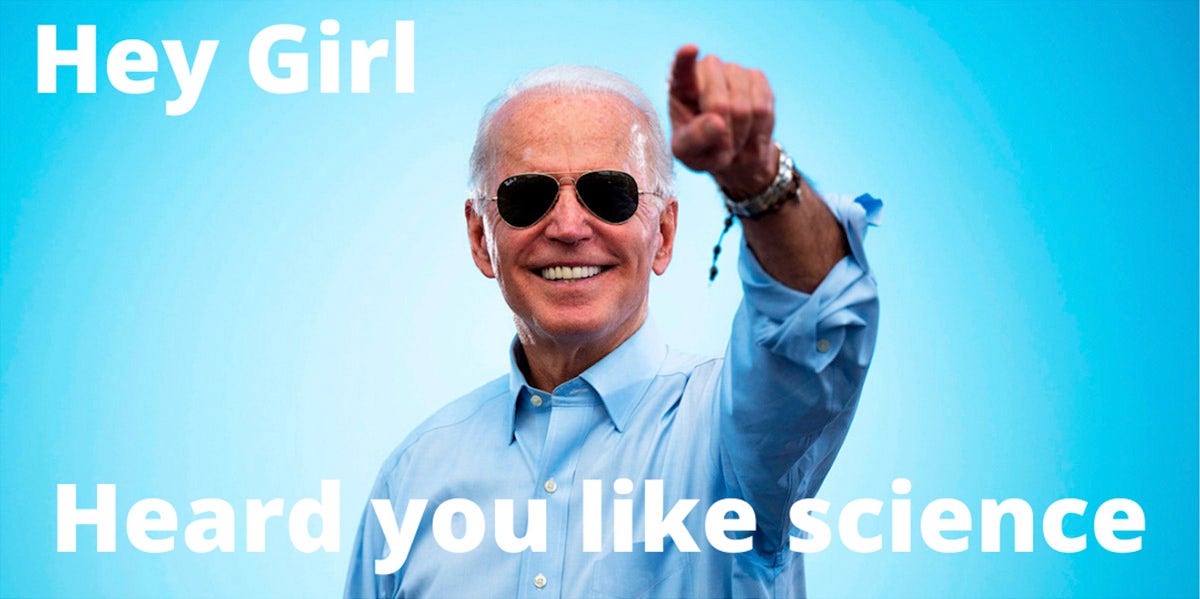President Biden Pledges Huge Increases In Science Funding (& The World Will Benefit For Generations)
Here's what gets better when we fully fund science.
 Stratos Brilakis / Shutterstock
Stratos Brilakis / Shutterstock President Joe Biden announced last week that his administration will be budgeting more money for science than America has allocated to the field for decades.
The last time the science budget was as high as he’s proposed, we sent astronauts to the moon. Neil Armstrong was frolicking on space dust and Alan Shepard was smacking extraterrestrial golf balls into the infinite void.
Back before iPhones, before TikTok, before project management software and robot vacuums, the U.S. had a science budget of over 2% of our gross domestic product (GDP).
There was a thirst for adventure and exploration fueled by President John F. Kennedy’s vision to put astronauts on the moon by the end of the 1960s.
But NASA isn't the only organization that benefits from increased science spending by the U.S. government.
RELATED: 35 Science Pick Up Lines To Fuel The Chemistry You Have
And, on less computing power than can be found on most modern calculators, NASA and its team of brilliant and ridiculously insane space farers accomplished that goal for the first time on July 20, 1969.
The last time America had a budget like this was before the floppy disk was invented, before the Walkman, the Apple Computer, the Rubik’s Cube, Disney World, Roe v. Wade, the bar code, and “Lassie.”
A major milestone that occurred around the same time as the peak science budget? Women were finally allowed to open their own bank accounts.
Now, President Biden wants to lift off once again into the stratosphere of high science budgets, once again targeting around 2% as the gold standard. This might not sound like much, and of course, if you’re comparing the allocation to what the government spends on defense or social programs, it really isn’t much.
But it’s over twice what we currently spend on science, which is a paltry .7% of GDP.
Who benefits from increaased science funding?
Anytime the government invests in research that produces science, the world benefits for generations. We’re still not done inventing things based on research from the original moon landings, for instance.
From fireproof materials, treatments for illnesses, to tires, we have a single investment in space exploration to thank for countless improvements to our lives and society.
NASA is so dang proud of all the stuff their efforts alone have been responsible for that they have a whole website dedicated to telling you about it.
Aside from space exploration, there are tons of other areas where science spending produces a wealth of public good: defense, private sector innovation, and even medical advancements.
In the early 70s, the Department of Defense began a pet program that blossomed into something that most people might be familiar with; it’s a little thing we call the Internet.
A study from 2019 found that government funding actually results in a third of all patents filed in the U.S.
Of course, there are skeptics in the area of government funding. Many believe that money for research should come from other sources. Private interest groups, nonprofit organizations, and industry groups often fund their own research.
But there are problems with this. There’s a well-studied funding bias that occurs where industry groups are more often to fund research that magically aligns with their own interests.
For decades, fossil fuel companies and the tobacco industry gaslit environmental authorities and public health advocates, pushing the evidence for the adverse health effects of their products under the rug while funding studies that spread contradictory or misleading information.
Exxonmobil knew about the effects of their activities on climate change and the environment for decades, but still elected to push self-serving narratives through self-funded studies.
Bias is inherent in the human condition, but science is the best system we have for creating an environment that’s as objective as possible. It stands to reason that allowing special interest groups to fund their own research isn’t always going to produce the most flawless results.
Government funding doesn’t just fund government endeavors, either. Funds are often given to universities and nonprofit organizations as grants that help cover costs that would otherwise be formidable obstacles for researchers.
These researchers are working on everything from curing diseases to finding out if mosquitoes like Skrillex (they don’t).
Funding science ultimately serves to make all of our lives easier, longer, and more fulfilling.
When the argument is raised that it’s a waste of time and resources to fund science, and that we should focus on more important issues closer to home, the argument is usually coming from the very people who aren’t interested in solving the problems they’re raising, anyway.
Because if they were, they’d know that things like poverty, global hunger, mental illness, terminal diseases, climate change, and all of the major issues that plague the human race could be conquered with a little more investment in science. We’re already well on the way with many of these problems, and more.
It’s just going to take a little time, and a tiny 2% slice of the pie.
Kevin Lankes, MFA, is an editor and author. His fiction and nonfiction have appeared in Here Comes Everyone, Pigeon Pages, Owl Hollow Press, The Huffington Post, The Riverdale Press, and more.

